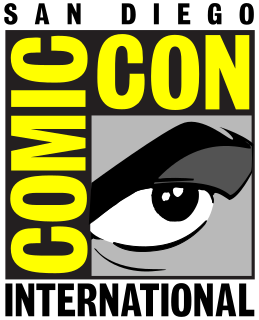A minicomic is a creator-published comic book, often photocopied and stapled or with a handmade binding. In the United Kingdom and Europe the term small press comic is equivalent with minicomic, reserved for those publications measuring A6 or less.

Life in Hell is a comic strip by Matt Groening, creator of The Simpsons, Futurama, and Disenchantment, which was published weekly from 1977 to 2012. The strip features anthropomorphic rabbits and a gay couple. The comic covers a wide range of subjects, such as love, sex, work, and death, and explores themes of angst, social alienation, self-loathing, and fear of inevitable doom.

Raw was a comics anthology edited by Art Spiegelman and Françoise Mouly and published in the United States by Mouly from 1980 to 1991. It was a flagship publication of the 1980s alternative comics movement, serving as a more intellectual counterpoint to Robert Crumb's visceral Weirdo, which followed squarely in the underground tradition of Zap and Arcade. Along with the more genre-oriented Heavy Metal it was also one of the main venues for European comics in the United States in its day.
Mary Fleener (b.1951) is an American alternative comics artist, writer and musician from Los Angeles. Fleener's drawing style, which she calls cubismo, derives from the cubist aesthetic and other artistic traditions. Her first publication was a work about Zora Neale Hurston, called Hoodoo (1988), followed by the semi-autobiographical comics series Slutburger, and the anthology Life of the Party (1996). She is a member of the rock band called The Wigbillies.
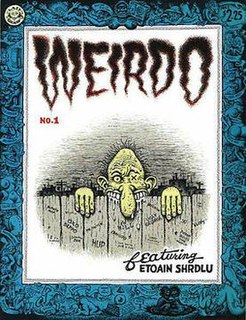
Weirdo is a magazine-sized comics anthology created by Robert Crumb and published by Last Gasp from 1981 to 1993.
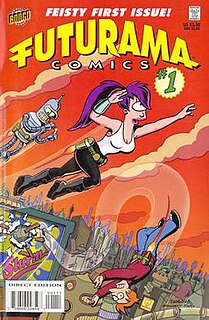
Futurama Comics is a comic book series published by Bongo Comics and based on the television series Futurama. It has been published bi-monthly in the United States since November 2000. It has been published in the United Kingdom and Australia since 2002 and four trade paperbacks have been released. During the production hiatus between 2003 and 2006 and from 2013 to present it is the only new Futurama material being made. The comic book series continues its run, even after two cancellations of the TV series. Issue #82 and #83 were distributed via the Futuramaland app, and will not be physically printed.
Panini Comics is an Italian comic book publisher. A division of Panini Group, which also produces collectable stickers, it is headquartered in Modena, Italy. The company publishes comic books in Argentina, Brazil, Chile, France, Germany, Hungary, Italy, Mexico, Portugal, Spain and the United Kingdom, as well as manga in several non-English-speaking countries through the Planet Manga publishing division.

Escape magazine was a British comic strip magazine founded and edited by Paul Gravett and Peter Stanbury. Nineteen issues were published between 1983 and 1989. Eddie Campbell, Phil Elliott and Glenn Dakin were amongst the many cartoonists published within its pages.
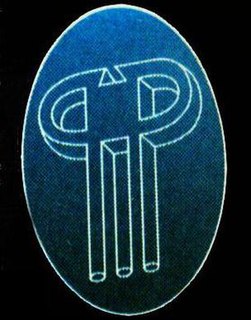
Paradox Press was a division of DC Comics formed in 1993 after editor Mark Nevelow departed from Piranha Press. Under the initial editorship of Andrew Helfer and Bronwyn Carlton the imprint was renamed. It is best known for graphic novels like A History of Violence and Road to Perdition. Jim Higgins edited the line after Helfer's departure, and Heidi MacDonald briefly took the helm in 2000 at the time of the line's final three Big Books, none of which ever saw publication.
Blab! is a comics anthology edited by Monte Beauchamp. Though its primary focus is comics, it regularly features articles with non-comics illustration and graphic design. The first two issues (1986-87) were published by Beauchamp's own imprint, Monte Comix. Kitchen Sink Press took over with issue #3 in 1988, through #8, also publishing 2nd editions of #1 and 2 along the way. Issues #9–18 were published annually by Fantagraphics Books in a 120-page, 10" x 10" square format featuring both black-and-white and color art.

Simpsons Illustrated was a companion magazine to the American animated television show The Simpsons. It featured, among many other things, articles and interviews about the show, and comics based on the Simpsons universe. Simpsons Illustrated was published between 1991 and 1993 and led to the establishment of the Bongo Comics Group.
The Words & Pictures Museum of Fine Sequential Art was an art museum in Northampton, Massachusetts devoted to exhibitions of narrative art, cartoons, comic books, and graphic novels. Open to the public from 1992 to 1999, the Museum's collection at one point numbered 20,000 original works from hundreds of artists including Simon Bisley, Vaughn Bodē, Robert Crumb, Richard Corben, Frank Frazetta, Jaime Hernandez, Jack Kirby, George Pratt, Dave McKean, Frank Miller, Jon J Muth, Bill Sienkiewicz, and Gilbert Shelton.
Dean Rankine is an Australian comics artist, writer and illustrator. Rankine's comics work has appeared in many children's magazines - KidZone, Explore, Venue, Mania, Krash and Wacky But True (Australia), Kids Alive, The War Cry, Priority, Sorthvit (Norway) and TFL, as well as Australian anthology comics, and he has illustrated books for Ashton Scholastic and Acorn Press, and most recently, The Dandy and The Beano, among others.

The Narrative Corpse is a chain story, or comic jam, by 69 all-star cartoonists based on Le Cadavre Exquis, a popular game played by André Breton and his Surrealist friends to break free from the constraints of rational thought.
Gary Spencer Millidge is a British comic book creator best known for his series Strangehaven. He has also written and contributed to books about comics.
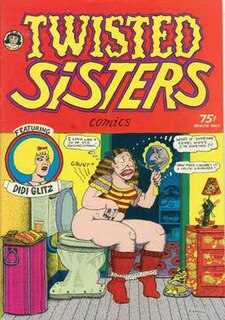
Twisted Sisters is an all-female underground comics anthology initially put together by Aline Kominsky and Diane Noomin, published in various forms from 1976 to 1994. In addition to Kominsky and Noomin, contributors to Twisted Sisters included M. K. Brown, Dame Darcy, Julie Doucet, Debbie Drechsler, Mary Fleener, Phoebe Gloeckner, Krystine Kryttre, Carol Lay, Dori Seda, and Carol Tyler.





